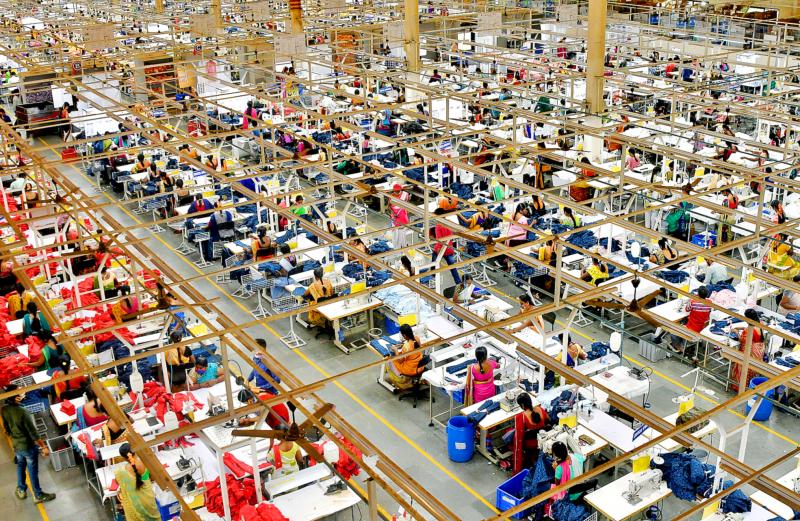India and the EU yesterday resumed talks on a free-trade deal after a nine-year gap, as Western countries seek to wean New Delhi off its close economic ties to Russia.
Dubbed the “tariff king” by former US president Donald Trump, India has become more open to lowering trade barriers in recent years and is negotiating pacts with several other countries.
The Asian giant has refused to condemn Russia’s invasion of Ukraine, even increasing oil purchases from its long-standing strategic ally and biggest supplier of arms.

Photo: Reuters
The EU is India’s second-biggest trading partner after the US, but talks with the bloc broke down in 2013 over issues including tariff reductions and patent protection.
Merchandise trade hit an all-time high of US$116 billion in 2021-2022, with India’s exports to the 27-member EU hitting US$65 billion, according to New Delhi.
“Both sides are aiming for the trade negotiations to be broad-based, balanced and comprehensive, based on the principles of fairness and reciprocity. There will also be discussions on resolving the market access issues which are impeding bilateral trade,” the Indian Ministry of Commerce said earlier this month when announcing the first round of talks in New Delhi, which were due to run until Friday.
India in February signed a major economic partnership agreement with the United Arab Emirates and in April agreed an interim free-trade deal with Australia, aiming to finish off a full pact by the end of the year.
India is also in trade negotiations with Canada, Israel and the UK. British Prime Minister Boris Johnson said on a visit in April that the UK and India hoped to nail down an accord by October.

MULTIFACETED: A task force has analyzed possible scenarios and created responses to assist domestic industries in dealing with US tariffs, the economics minister said The Executive Yuan is tomorrow to announce countermeasures to US President Donald Trump’s planned reciprocal tariffs, although the details of the plan would not be made public until Monday next week, Minister of Economic Affairs J.W. Kuo (郭智輝) said yesterday. The Cabinet established an economic and trade task force in November last year to deal with US trade and tariff related issues, Kuo told reporters outside the legislature in Taipei. The task force has been analyzing and evaluating all kinds of scenarios to identify suitable responses and determine how best to assist domestic industries in managing the effects of Trump’s tariffs, he

TIGHT-LIPPED: UMC said it had no merger plans at the moment, after Nikkei Asia reported that the firm and GlobalFoundries were considering restarting merger talks United Microelectronics Corp (UMC, 聯電), the world’s No. 4 contract chipmaker, yesterday launched a new US$5 billion 12-inch chip factory in Singapore as part of its latest effort to diversify its manufacturing footprint amid growing geopolitical risks. The new factory, adjacent to UMC’s existing Singapore fab in the Pasir Res Wafer Fab Park, is scheduled to enter volume production next year, utilizing mature 22-nanometer and 28-nanometer process technologies, UMC said in a statement. The company plans to invest US$5 billion during the first phase of the new fab, which would have an installed capacity of 30,000 12-inch wafers per month, it said. The

Taiwan’s official purchasing managers’ index (PMI) last month rose 0.2 percentage points to 54.2, in a second consecutive month of expansion, thanks to front-loading demand intended to avoid potential US tariff hikes, the Chung-Hua Institution for Economic Research (CIER, 中華經濟研究院) said yesterday. While short-term demand appeared robust, uncertainties rose due to US President Donald Trump’s unpredictable trade policy, CIER president Lien Hsien-ming (連賢明) told a news conference in Taipei. Taiwan’s economy this year would be characterized by high-level fluctuations and the volatility would be wilder than most expect, Lien said Demand for electronics, particularly semiconductors, continues to benefit from US technology giants’ effort

‘SWASTICAR’: Tesla CEO Elon Musk’s close association with Donald Trump has prompted opponents to brand him a ‘Nazi’ and resulted in a dramatic drop in sales Demonstrators descended on Tesla Inc dealerships across the US, and in Europe and Canada on Saturday to protest company chief Elon Musk, who has amassed extraordinary power as a top adviser to US President Donald Trump. Waving signs with messages such as “Musk is stealing our money” and “Reclaim our country,” the protests largely took place peacefully following fiery episodes of vandalism on Tesla vehicles, dealerships and other facilities in recent weeks that US officials have denounced as terrorism. Hundreds rallied on Saturday outside the Tesla dealership in Manhattan. Some blasted Musk, the world’s richest man, while others demanded the shuttering of his